Relationship Between Leadership, PsyCap, and Employee Performance
VerifiedAdded on 2022/09/28
|10
|3035
|20
Essay
AI Summary
This essay examines the intricate relationship between authentic leadership, Leader-Member Exchange (LMX), and the psychological capital (PsyCap) of employees. It delves into how authentic leadership, characterized by values-driven actions and charisma, fosters enduring organizations and motivates employees, leading to superior customer service and long-term value creation. The essay explores the significance of LMX, emphasizing the development of trust-based relationships between leaders and followers to enhance organizational effectiveness. Furthermore, it discusses the building of psychological capital in different employee groups, including professionals, administrative staff, blue-collar, and white-collar workers, highlighting the importance of organizational culture, human resource development, and emotional regulation. The essay also analyzes the impact of emotions on employee performance, emphasizing how emotions influence job satisfaction, decision-making, and interpersonal relations. It provides insights into strategies for cultivating a positive work environment and fostering employee engagement, crucial for achieving desired organizational outcomes. Overall, the essay provides a comprehensive overview of the complex interplay between leadership, employee well-being, and organizational success.
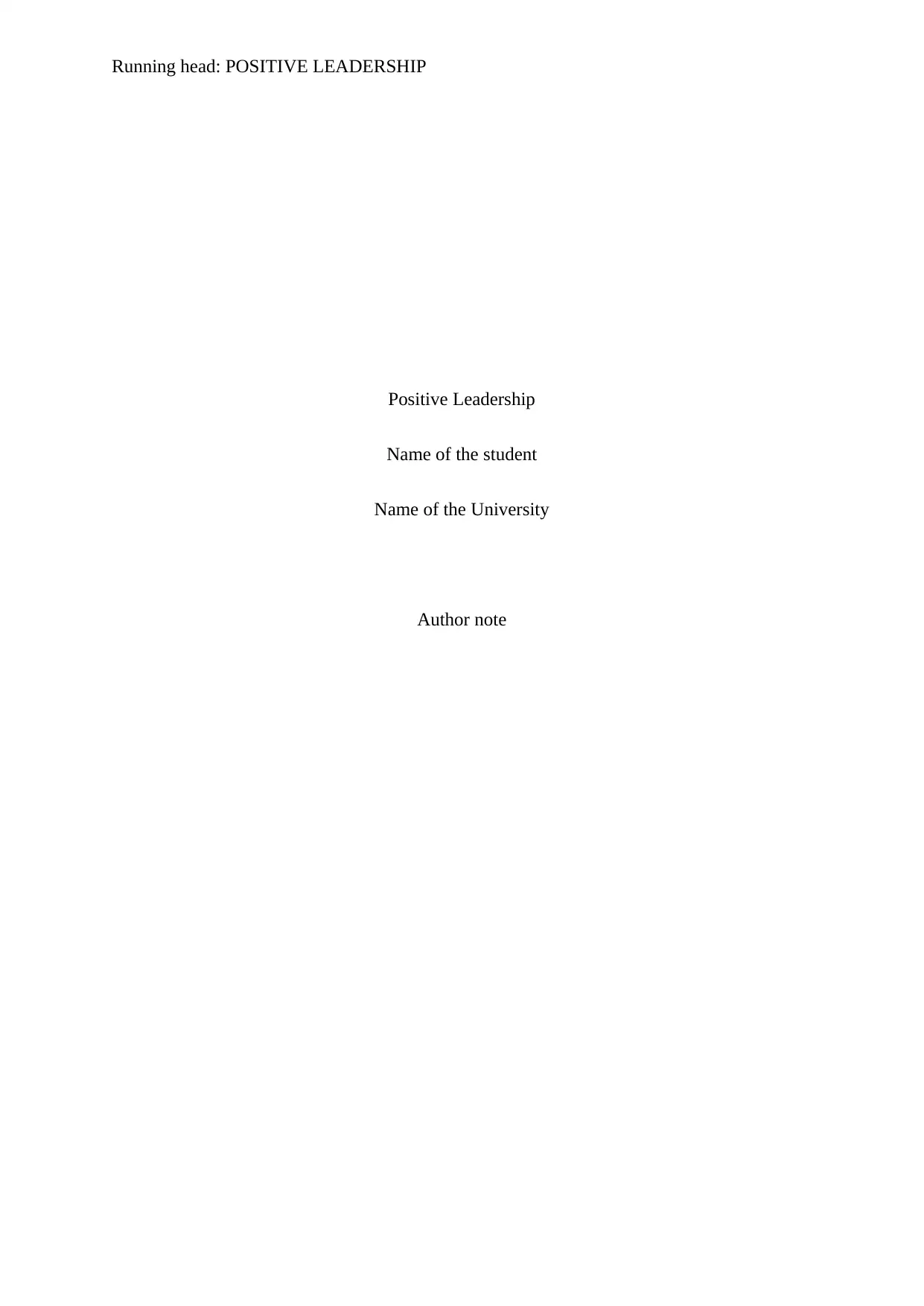
Running head: POSITIVE LEADERSHIP
Positive Leadership
Name of the student
Name of the University
Author note
Positive Leadership
Name of the student
Name of the University
Author note
Paraphrase This Document
Need a fresh take? Get an instant paraphrase of this document with our AI Paraphraser
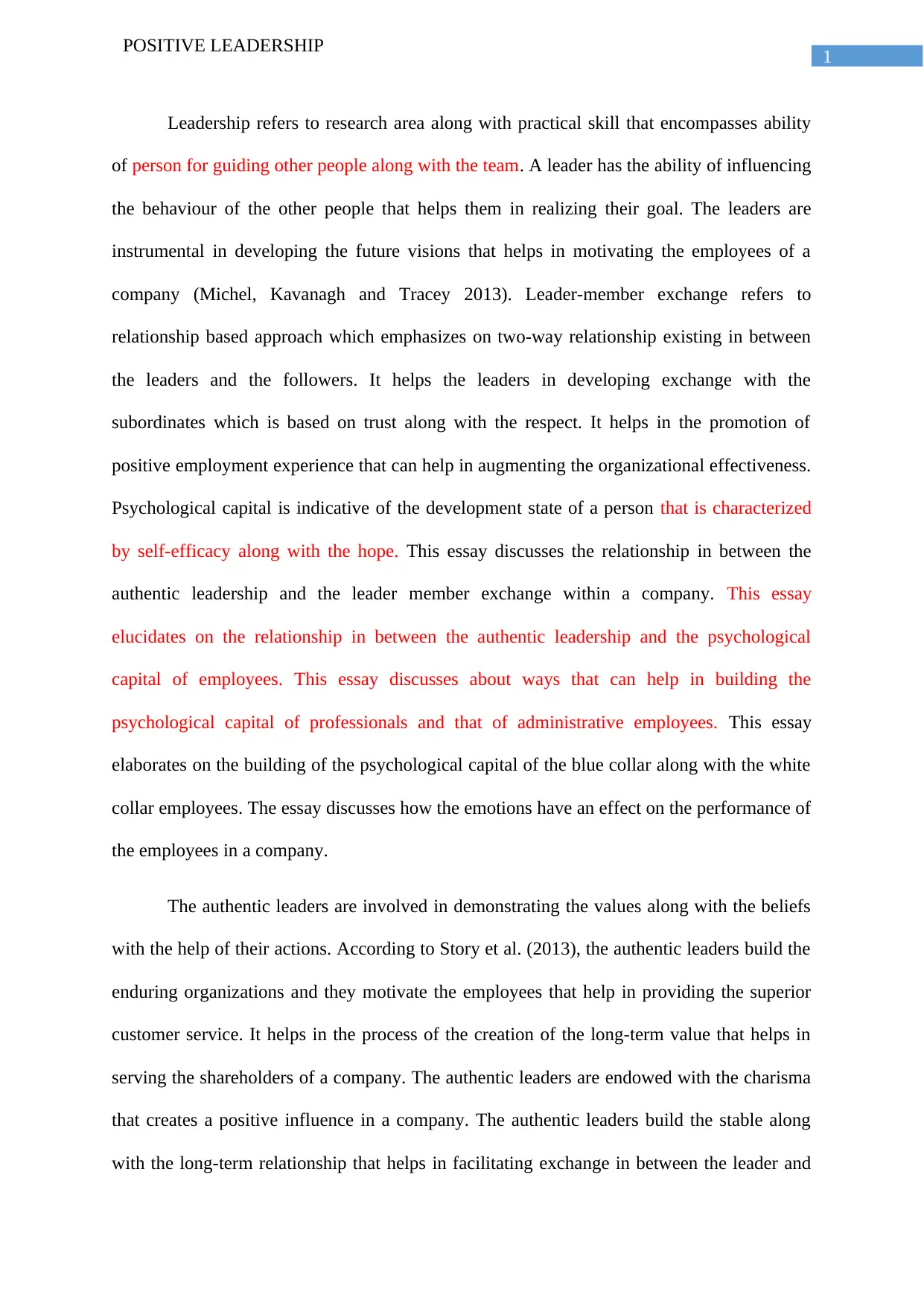
1
POSITIVE LEADERSHIP
Leadership refers to research area along with practical skill that encompasses ability
of person for guiding other people along with the team. A leader has the ability of influencing
the behaviour of the other people that helps them in realizing their goal. The leaders are
instrumental in developing the future visions that helps in motivating the employees of a
company (Michel, Kavanagh and Tracey 2013). Leader-member exchange refers to
relationship based approach which emphasizes on two-way relationship existing in between
the leaders and the followers. It helps the leaders in developing exchange with the
subordinates which is based on trust along with the respect. It helps in the promotion of
positive employment experience that can help in augmenting the organizational effectiveness.
Psychological capital is indicative of the development state of a person that is characterized
by self-efficacy along with the hope. This essay discusses the relationship in between the
authentic leadership and the leader member exchange within a company. This essay
elucidates on the relationship in between the authentic leadership and the psychological
capital of employees. This essay discusses about ways that can help in building the
psychological capital of professionals and that of administrative employees. This essay
elaborates on the building of the psychological capital of the blue collar along with the white
collar employees. The essay discusses how the emotions have an effect on the performance of
the employees in a company.
The authentic leaders are involved in demonstrating the values along with the beliefs
with the help of their actions. According to Story et al. (2013), the authentic leaders build the
enduring organizations and they motivate the employees that help in providing the superior
customer service. It helps in the process of the creation of the long-term value that helps in
serving the shareholders of a company. The authentic leaders are endowed with the charisma
that creates a positive influence in a company. The authentic leaders build the stable along
with the long-term relationship that helps in facilitating exchange in between the leader and
POSITIVE LEADERSHIP
Leadership refers to research area along with practical skill that encompasses ability
of person for guiding other people along with the team. A leader has the ability of influencing
the behaviour of the other people that helps them in realizing their goal. The leaders are
instrumental in developing the future visions that helps in motivating the employees of a
company (Michel, Kavanagh and Tracey 2013). Leader-member exchange refers to
relationship based approach which emphasizes on two-way relationship existing in between
the leaders and the followers. It helps the leaders in developing exchange with the
subordinates which is based on trust along with the respect. It helps in the promotion of
positive employment experience that can help in augmenting the organizational effectiveness.
Psychological capital is indicative of the development state of a person that is characterized
by self-efficacy along with the hope. This essay discusses the relationship in between the
authentic leadership and the leader member exchange within a company. This essay
elucidates on the relationship in between the authentic leadership and the psychological
capital of employees. This essay discusses about ways that can help in building the
psychological capital of professionals and that of administrative employees. This essay
elaborates on the building of the psychological capital of the blue collar along with the white
collar employees. The essay discusses how the emotions have an effect on the performance of
the employees in a company.
The authentic leaders are involved in demonstrating the values along with the beliefs
with the help of their actions. According to Story et al. (2013), the authentic leaders build the
enduring organizations and they motivate the employees that help in providing the superior
customer service. It helps in the process of the creation of the long-term value that helps in
serving the shareholders of a company. The authentic leaders are endowed with the charisma
that creates a positive influence in a company. The authentic leaders build the stable along
with the long-term relationship that helps in facilitating exchange in between the leader and
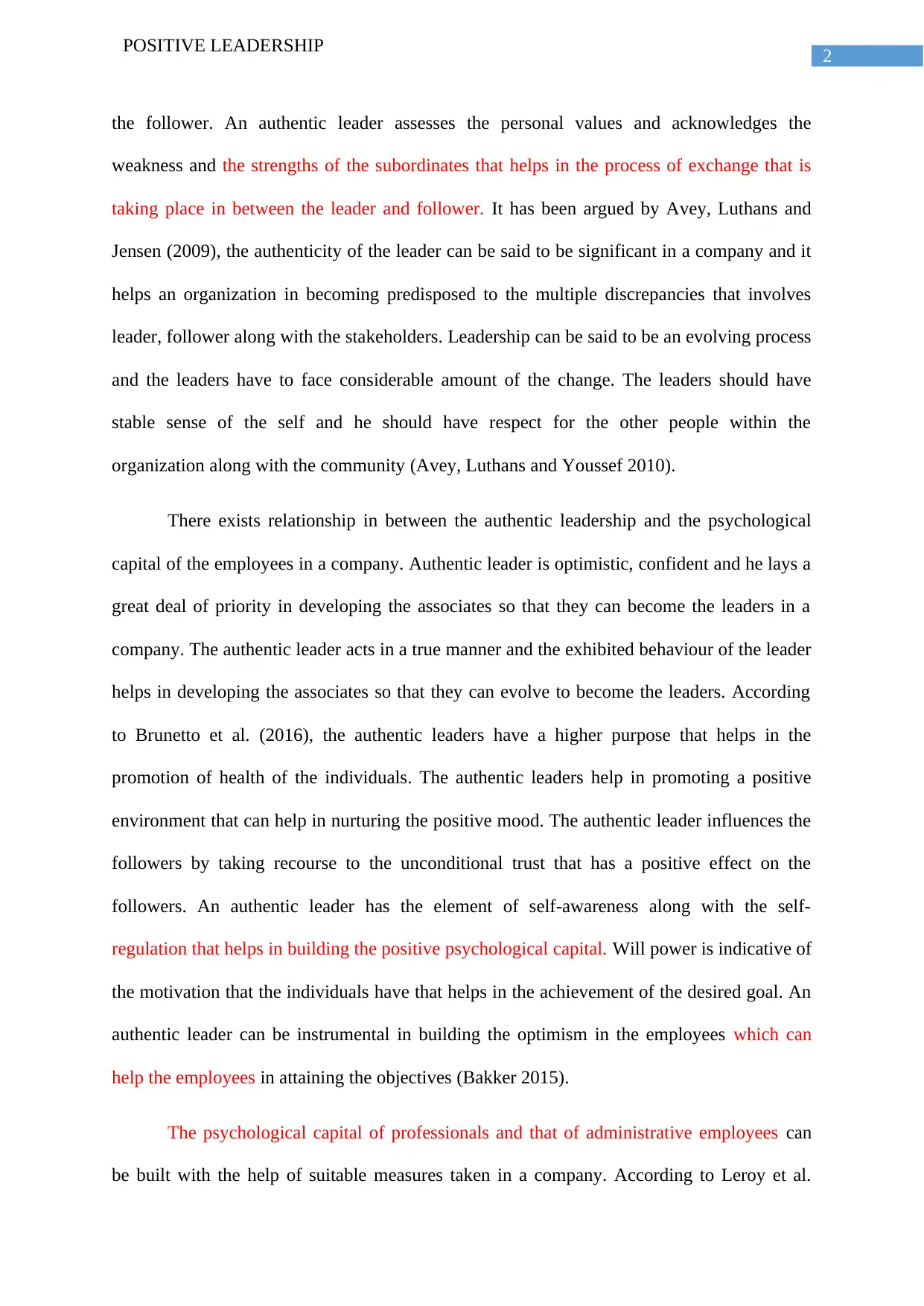
2
POSITIVE LEADERSHIP
the follower. An authentic leader assesses the personal values and acknowledges the
weakness and the strengths of the subordinates that helps in the process of exchange that is
taking place in between the leader and follower. It has been argued by Avey, Luthans and
Jensen (2009), the authenticity of the leader can be said to be significant in a company and it
helps an organization in becoming predisposed to the multiple discrepancies that involves
leader, follower along with the stakeholders. Leadership can be said to be an evolving process
and the leaders have to face considerable amount of the change. The leaders should have
stable sense of the self and he should have respect for the other people within the
organization along with the community (Avey, Luthans and Youssef 2010).
There exists relationship in between the authentic leadership and the psychological
capital of the employees in a company. Authentic leader is optimistic, confident and he lays a
great deal of priority in developing the associates so that they can become the leaders in a
company. The authentic leader acts in a true manner and the exhibited behaviour of the leader
helps in developing the associates so that they can evolve to become the leaders. According
to Brunetto et al. (2016), the authentic leaders have a higher purpose that helps in the
promotion of health of the individuals. The authentic leaders help in promoting a positive
environment that can help in nurturing the positive mood. The authentic leader influences the
followers by taking recourse to the unconditional trust that has a positive effect on the
followers. An authentic leader has the element of self-awareness along with the self-
regulation that helps in building the positive psychological capital. Will power is indicative of
the motivation that the individuals have that helps in the achievement of the desired goal. An
authentic leader can be instrumental in building the optimism in the employees which can
help the employees in attaining the objectives (Bakker 2015).
The psychological capital of professionals and that of administrative employees can
be built with the help of suitable measures taken in a company. According to Leroy et al.
POSITIVE LEADERSHIP
the follower. An authentic leader assesses the personal values and acknowledges the
weakness and the strengths of the subordinates that helps in the process of exchange that is
taking place in between the leader and follower. It has been argued by Avey, Luthans and
Jensen (2009), the authenticity of the leader can be said to be significant in a company and it
helps an organization in becoming predisposed to the multiple discrepancies that involves
leader, follower along with the stakeholders. Leadership can be said to be an evolving process
and the leaders have to face considerable amount of the change. The leaders should have
stable sense of the self and he should have respect for the other people within the
organization along with the community (Avey, Luthans and Youssef 2010).
There exists relationship in between the authentic leadership and the psychological
capital of the employees in a company. Authentic leader is optimistic, confident and he lays a
great deal of priority in developing the associates so that they can become the leaders in a
company. The authentic leader acts in a true manner and the exhibited behaviour of the leader
helps in developing the associates so that they can evolve to become the leaders. According
to Brunetto et al. (2016), the authentic leaders have a higher purpose that helps in the
promotion of health of the individuals. The authentic leaders help in promoting a positive
environment that can help in nurturing the positive mood. The authentic leader influences the
followers by taking recourse to the unconditional trust that has a positive effect on the
followers. An authentic leader has the element of self-awareness along with the self-
regulation that helps in building the positive psychological capital. Will power is indicative of
the motivation that the individuals have that helps in the achievement of the desired goal. An
authentic leader can be instrumental in building the optimism in the employees which can
help the employees in attaining the objectives (Bakker 2015).
The psychological capital of professionals and that of administrative employees can
be built with the help of suitable measures taken in a company. According to Leroy et al.
⊘ This is a preview!⊘
Do you want full access?
Subscribe today to unlock all pages.

Trusted by 1+ million students worldwide
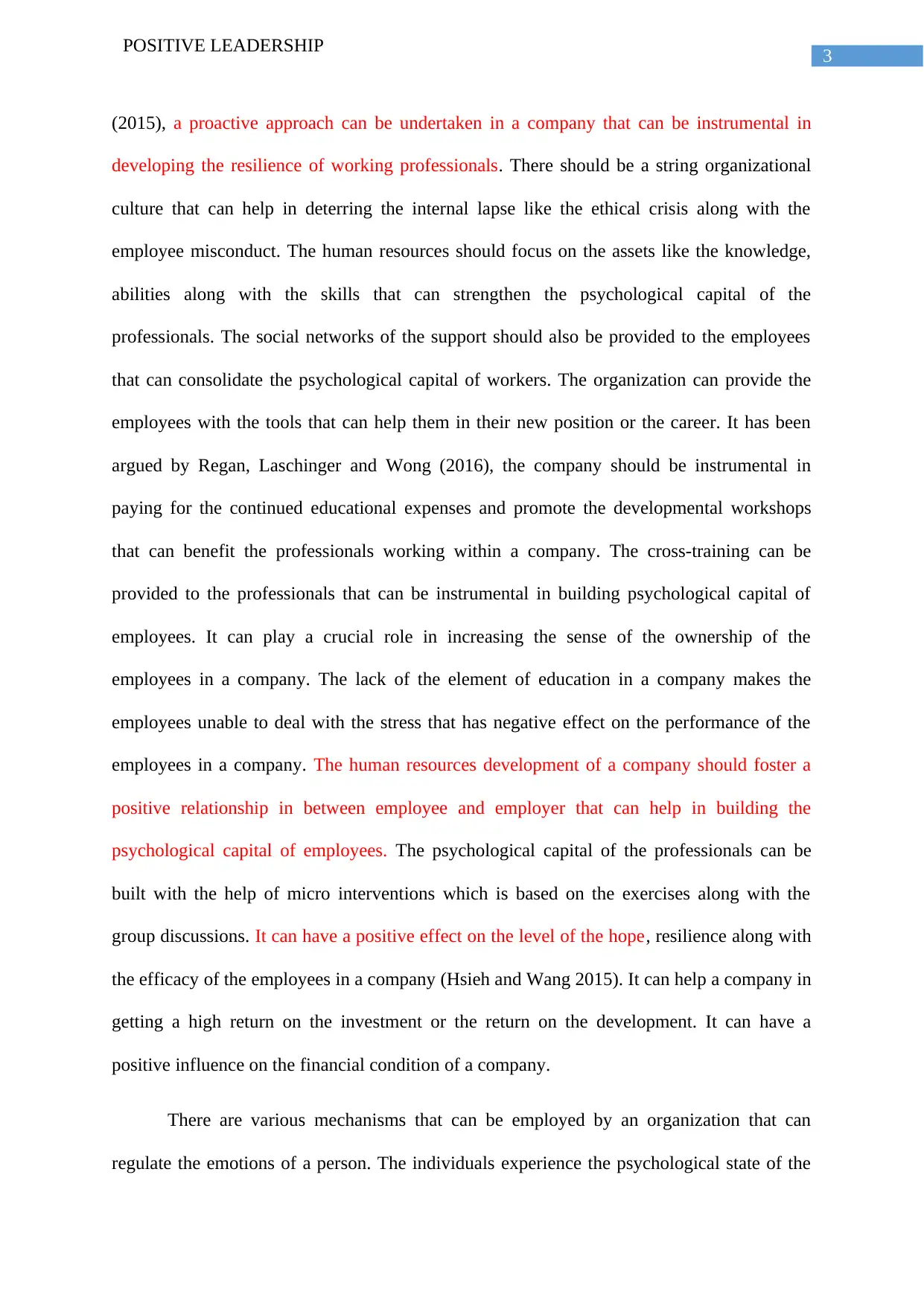
3
POSITIVE LEADERSHIP
(2015), a proactive approach can be undertaken in a company that can be instrumental in
developing the resilience of working professionals. There should be a string organizational
culture that can help in deterring the internal lapse like the ethical crisis along with the
employee misconduct. The human resources should focus on the assets like the knowledge,
abilities along with the skills that can strengthen the psychological capital of the
professionals. The social networks of the support should also be provided to the employees
that can consolidate the psychological capital of workers. The organization can provide the
employees with the tools that can help them in their new position or the career. It has been
argued by Regan, Laschinger and Wong (2016), the company should be instrumental in
paying for the continued educational expenses and promote the developmental workshops
that can benefit the professionals working within a company. The cross-training can be
provided to the professionals that can be instrumental in building psychological capital of
employees. It can play a crucial role in increasing the sense of the ownership of the
employees in a company. The lack of the element of education in a company makes the
employees unable to deal with the stress that has negative effect on the performance of the
employees in a company. The human resources development of a company should foster a
positive relationship in between employee and employer that can help in building the
psychological capital of employees. The psychological capital of the professionals can be
built with the help of micro interventions which is based on the exercises along with the
group discussions. It can have a positive effect on the level of the hope, resilience along with
the efficacy of the employees in a company (Hsieh and Wang 2015). It can help a company in
getting a high return on the investment or the return on the development. It can have a
positive influence on the financial condition of a company.
There are various mechanisms that can be employed by an organization that can
regulate the emotions of a person. The individuals experience the psychological state of the
POSITIVE LEADERSHIP
(2015), a proactive approach can be undertaken in a company that can be instrumental in
developing the resilience of working professionals. There should be a string organizational
culture that can help in deterring the internal lapse like the ethical crisis along with the
employee misconduct. The human resources should focus on the assets like the knowledge,
abilities along with the skills that can strengthen the psychological capital of the
professionals. The social networks of the support should also be provided to the employees
that can consolidate the psychological capital of workers. The organization can provide the
employees with the tools that can help them in their new position or the career. It has been
argued by Regan, Laschinger and Wong (2016), the company should be instrumental in
paying for the continued educational expenses and promote the developmental workshops
that can benefit the professionals working within a company. The cross-training can be
provided to the professionals that can be instrumental in building psychological capital of
employees. It can play a crucial role in increasing the sense of the ownership of the
employees in a company. The lack of the element of education in a company makes the
employees unable to deal with the stress that has negative effect on the performance of the
employees in a company. The human resources development of a company should foster a
positive relationship in between employee and employer that can help in building the
psychological capital of employees. The psychological capital of the professionals can be
built with the help of micro interventions which is based on the exercises along with the
group discussions. It can have a positive effect on the level of the hope, resilience along with
the efficacy of the employees in a company (Hsieh and Wang 2015). It can help a company in
getting a high return on the investment or the return on the development. It can have a
positive influence on the financial condition of a company.
There are various mechanisms that can be employed by an organization that can
regulate the emotions of a person. The individuals experience the psychological state of the
Paraphrase This Document
Need a fresh take? Get an instant paraphrase of this document with our AI Paraphraser
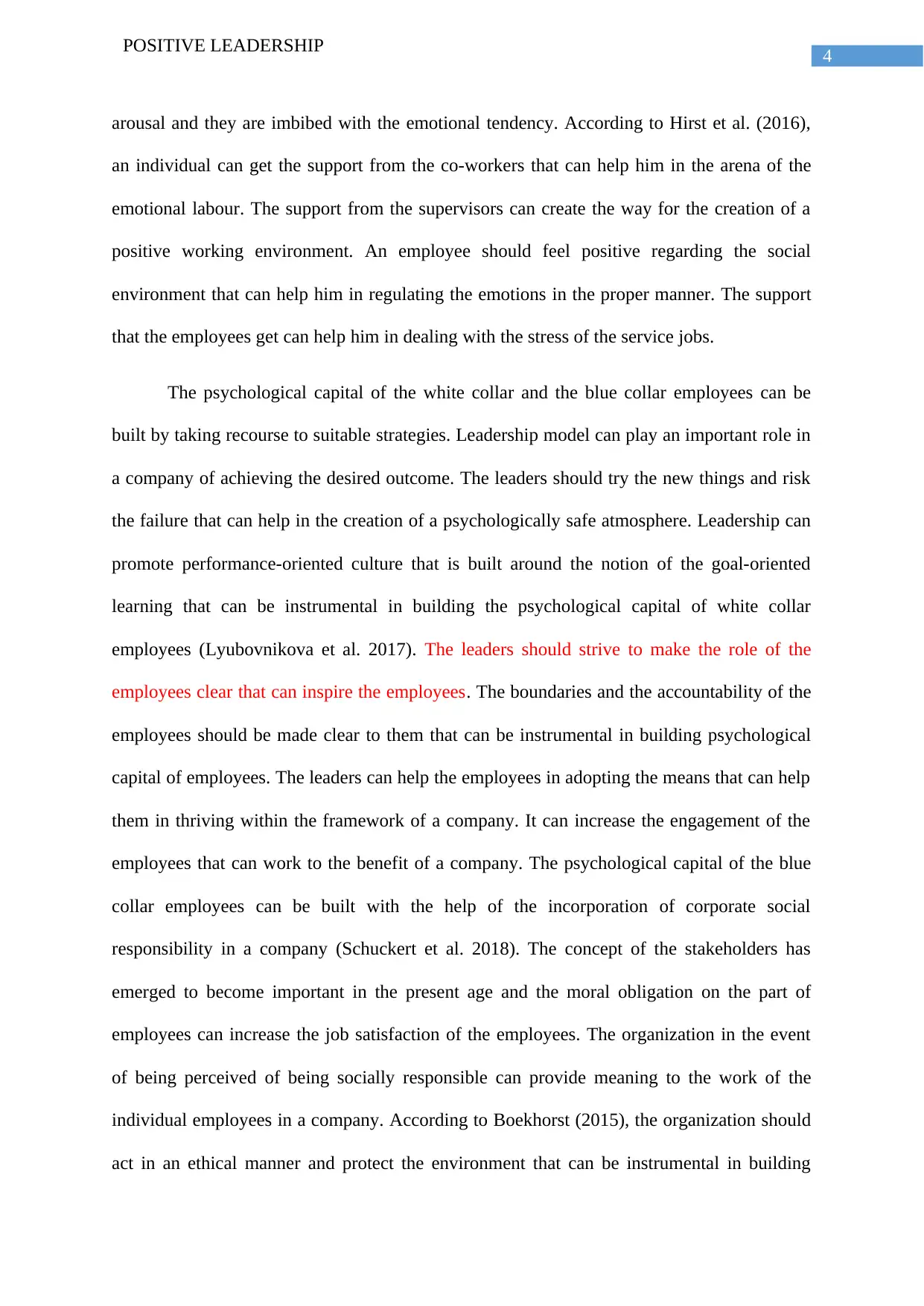
4
POSITIVE LEADERSHIP
arousal and they are imbibed with the emotional tendency. According to Hirst et al. (2016),
an individual can get the support from the co-workers that can help him in the arena of the
emotional labour. The support from the supervisors can create the way for the creation of a
positive working environment. An employee should feel positive regarding the social
environment that can help him in regulating the emotions in the proper manner. The support
that the employees get can help him in dealing with the stress of the service jobs.
The psychological capital of the white collar and the blue collar employees can be
built by taking recourse to suitable strategies. Leadership model can play an important role in
a company of achieving the desired outcome. The leaders should try the new things and risk
the failure that can help in the creation of a psychologically safe atmosphere. Leadership can
promote performance-oriented culture that is built around the notion of the goal-oriented
learning that can be instrumental in building the psychological capital of white collar
employees (Lyubovnikova et al. 2017). The leaders should strive to make the role of the
employees clear that can inspire the employees. The boundaries and the accountability of the
employees should be made clear to them that can be instrumental in building psychological
capital of employees. The leaders can help the employees in adopting the means that can help
them in thriving within the framework of a company. It can increase the engagement of the
employees that can work to the benefit of a company. The psychological capital of the blue
collar employees can be built with the help of the incorporation of corporate social
responsibility in a company (Schuckert et al. 2018). The concept of the stakeholders has
emerged to become important in the present age and the moral obligation on the part of
employees can increase the job satisfaction of the employees. The organization in the event
of being perceived of being socially responsible can provide meaning to the work of the
individual employees in a company. According to Boekhorst (2015), the organization should
act in an ethical manner and protect the environment that can be instrumental in building
POSITIVE LEADERSHIP
arousal and they are imbibed with the emotional tendency. According to Hirst et al. (2016),
an individual can get the support from the co-workers that can help him in the arena of the
emotional labour. The support from the supervisors can create the way for the creation of a
positive working environment. An employee should feel positive regarding the social
environment that can help him in regulating the emotions in the proper manner. The support
that the employees get can help him in dealing with the stress of the service jobs.
The psychological capital of the white collar and the blue collar employees can be
built by taking recourse to suitable strategies. Leadership model can play an important role in
a company of achieving the desired outcome. The leaders should try the new things and risk
the failure that can help in the creation of a psychologically safe atmosphere. Leadership can
promote performance-oriented culture that is built around the notion of the goal-oriented
learning that can be instrumental in building the psychological capital of white collar
employees (Lyubovnikova et al. 2017). The leaders should strive to make the role of the
employees clear that can inspire the employees. The boundaries and the accountability of the
employees should be made clear to them that can be instrumental in building psychological
capital of employees. The leaders can help the employees in adopting the means that can help
them in thriving within the framework of a company. It can increase the engagement of the
employees that can work to the benefit of a company. The psychological capital of the blue
collar employees can be built with the help of the incorporation of corporate social
responsibility in a company (Schuckert et al. 2018). The concept of the stakeholders has
emerged to become important in the present age and the moral obligation on the part of
employees can increase the job satisfaction of the employees. The organization in the event
of being perceived of being socially responsible can provide meaning to the work of the
individual employees in a company. According to Boekhorst (2015), the organization should
act in an ethical manner and protect the environment that can be instrumental in building
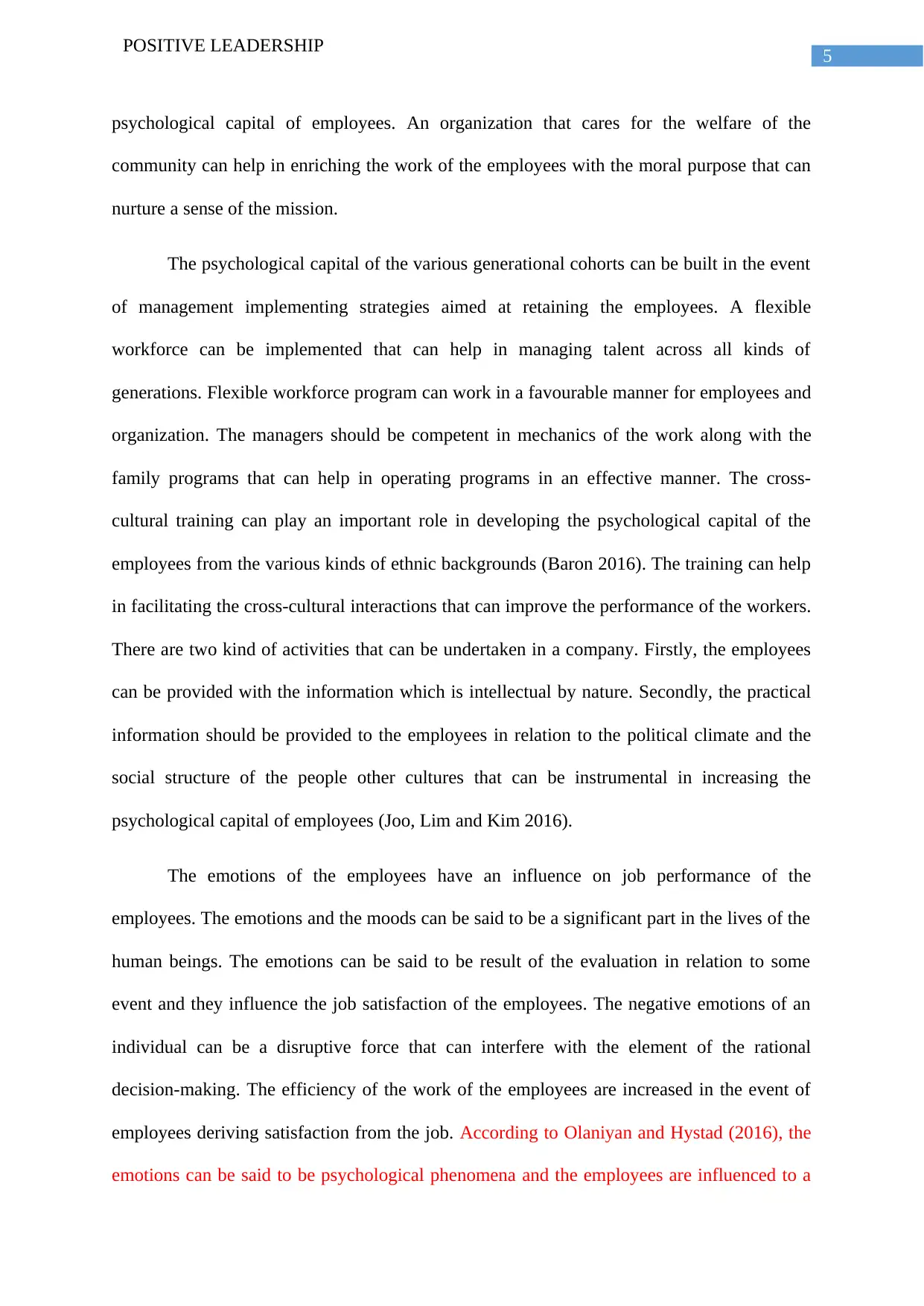
5
POSITIVE LEADERSHIP
psychological capital of employees. An organization that cares for the welfare of the
community can help in enriching the work of the employees with the moral purpose that can
nurture a sense of the mission.
The psychological capital of the various generational cohorts can be built in the event
of management implementing strategies aimed at retaining the employees. A flexible
workforce can be implemented that can help in managing talent across all kinds of
generations. Flexible workforce program can work in a favourable manner for employees and
organization. The managers should be competent in mechanics of the work along with the
family programs that can help in operating programs in an effective manner. The cross-
cultural training can play an important role in developing the psychological capital of the
employees from the various kinds of ethnic backgrounds (Baron 2016). The training can help
in facilitating the cross-cultural interactions that can improve the performance of the workers.
There are two kind of activities that can be undertaken in a company. Firstly, the employees
can be provided with the information which is intellectual by nature. Secondly, the practical
information should be provided to the employees in relation to the political climate and the
social structure of the people other cultures that can be instrumental in increasing the
psychological capital of employees (Joo, Lim and Kim 2016).
The emotions of the employees have an influence on job performance of the
employees. The emotions and the moods can be said to be a significant part in the lives of the
human beings. The emotions can be said to be result of the evaluation in relation to some
event and they influence the job satisfaction of the employees. The negative emotions of an
individual can be a disruptive force that can interfere with the element of the rational
decision-making. The efficiency of the work of the employees are increased in the event of
employees deriving satisfaction from the job. According to Olaniyan and Hystad (2016), the
emotions can be said to be psychological phenomena and the employees are influenced to a
POSITIVE LEADERSHIP
psychological capital of employees. An organization that cares for the welfare of the
community can help in enriching the work of the employees with the moral purpose that can
nurture a sense of the mission.
The psychological capital of the various generational cohorts can be built in the event
of management implementing strategies aimed at retaining the employees. A flexible
workforce can be implemented that can help in managing talent across all kinds of
generations. Flexible workforce program can work in a favourable manner for employees and
organization. The managers should be competent in mechanics of the work along with the
family programs that can help in operating programs in an effective manner. The cross-
cultural training can play an important role in developing the psychological capital of the
employees from the various kinds of ethnic backgrounds (Baron 2016). The training can help
in facilitating the cross-cultural interactions that can improve the performance of the workers.
There are two kind of activities that can be undertaken in a company. Firstly, the employees
can be provided with the information which is intellectual by nature. Secondly, the practical
information should be provided to the employees in relation to the political climate and the
social structure of the people other cultures that can be instrumental in increasing the
psychological capital of employees (Joo, Lim and Kim 2016).
The emotions of the employees have an influence on job performance of the
employees. The emotions and the moods can be said to be a significant part in the lives of the
human beings. The emotions can be said to be result of the evaluation in relation to some
event and they influence the job satisfaction of the employees. The negative emotions of an
individual can be a disruptive force that can interfere with the element of the rational
decision-making. The efficiency of the work of the employees are increased in the event of
employees deriving satisfaction from the job. According to Olaniyan and Hystad (2016), the
emotions can be said to be psychological phenomena and the employees are influenced to a
⊘ This is a preview!⊘
Do you want full access?
Subscribe today to unlock all pages.

Trusted by 1+ million students worldwide
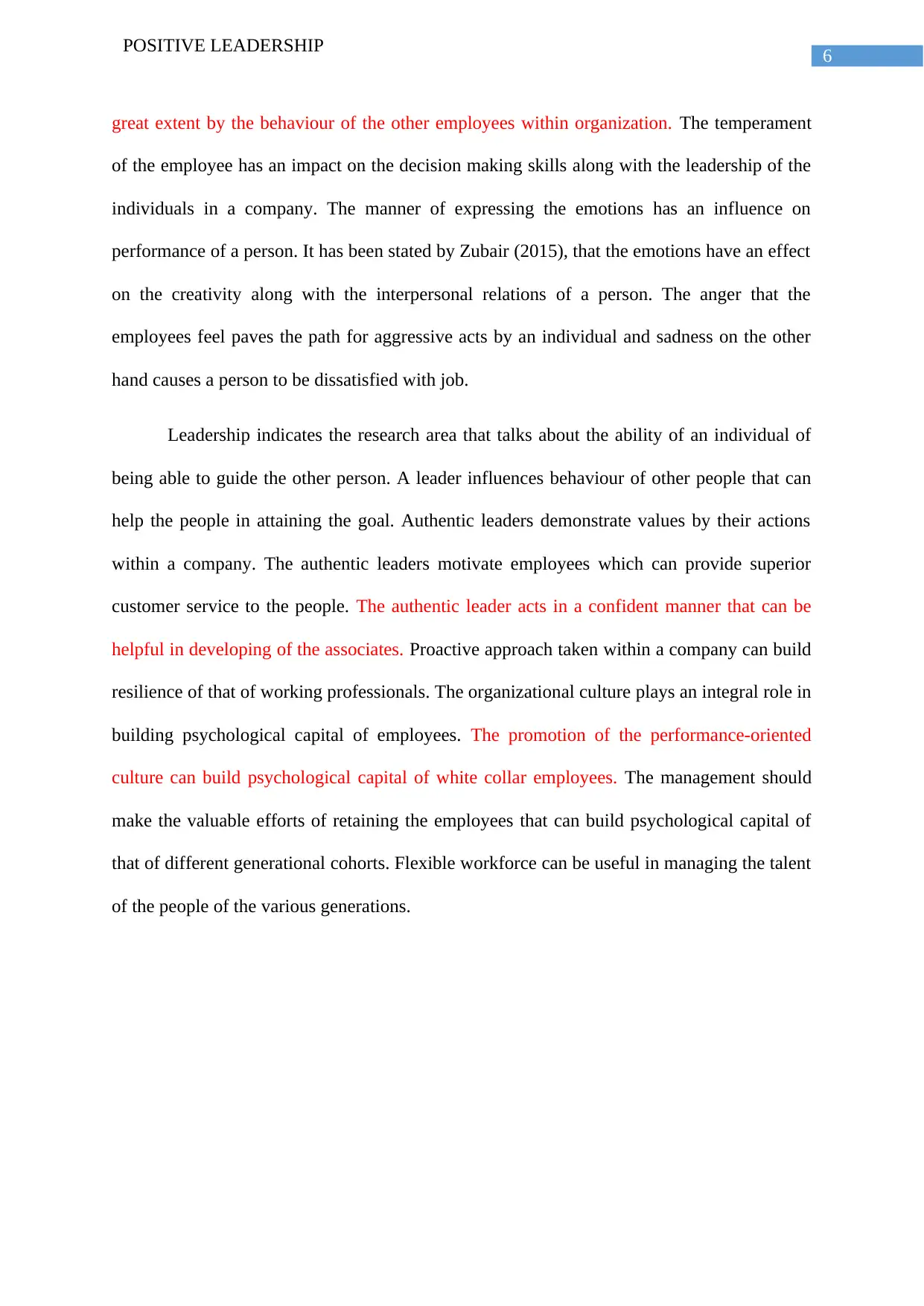
6
POSITIVE LEADERSHIP
great extent by the behaviour of the other employees within organization. The temperament
of the employee has an impact on the decision making skills along with the leadership of the
individuals in a company. The manner of expressing the emotions has an influence on
performance of a person. It has been stated by Zubair (2015), that the emotions have an effect
on the creativity along with the interpersonal relations of a person. The anger that the
employees feel paves the path for aggressive acts by an individual and sadness on the other
hand causes a person to be dissatisfied with job.
Leadership indicates the research area that talks about the ability of an individual of
being able to guide the other person. A leader influences behaviour of other people that can
help the people in attaining the goal. Authentic leaders demonstrate values by their actions
within a company. The authentic leaders motivate employees which can provide superior
customer service to the people. The authentic leader acts in a confident manner that can be
helpful in developing of the associates. Proactive approach taken within a company can build
resilience of that of working professionals. The organizational culture plays an integral role in
building psychological capital of employees. The promotion of the performance-oriented
culture can build psychological capital of white collar employees. The management should
make the valuable efforts of retaining the employees that can build psychological capital of
that of different generational cohorts. Flexible workforce can be useful in managing the talent
of the people of the various generations.
POSITIVE LEADERSHIP
great extent by the behaviour of the other employees within organization. The temperament
of the employee has an impact on the decision making skills along with the leadership of the
individuals in a company. The manner of expressing the emotions has an influence on
performance of a person. It has been stated by Zubair (2015), that the emotions have an effect
on the creativity along with the interpersonal relations of a person. The anger that the
employees feel paves the path for aggressive acts by an individual and sadness on the other
hand causes a person to be dissatisfied with job.
Leadership indicates the research area that talks about the ability of an individual of
being able to guide the other person. A leader influences behaviour of other people that can
help the people in attaining the goal. Authentic leaders demonstrate values by their actions
within a company. The authentic leaders motivate employees which can provide superior
customer service to the people. The authentic leader acts in a confident manner that can be
helpful in developing of the associates. Proactive approach taken within a company can build
resilience of that of working professionals. The organizational culture plays an integral role in
building psychological capital of employees. The promotion of the performance-oriented
culture can build psychological capital of white collar employees. The management should
make the valuable efforts of retaining the employees that can build psychological capital of
that of different generational cohorts. Flexible workforce can be useful in managing the talent
of the people of the various generations.
Paraphrase This Document
Need a fresh take? Get an instant paraphrase of this document with our AI Paraphraser
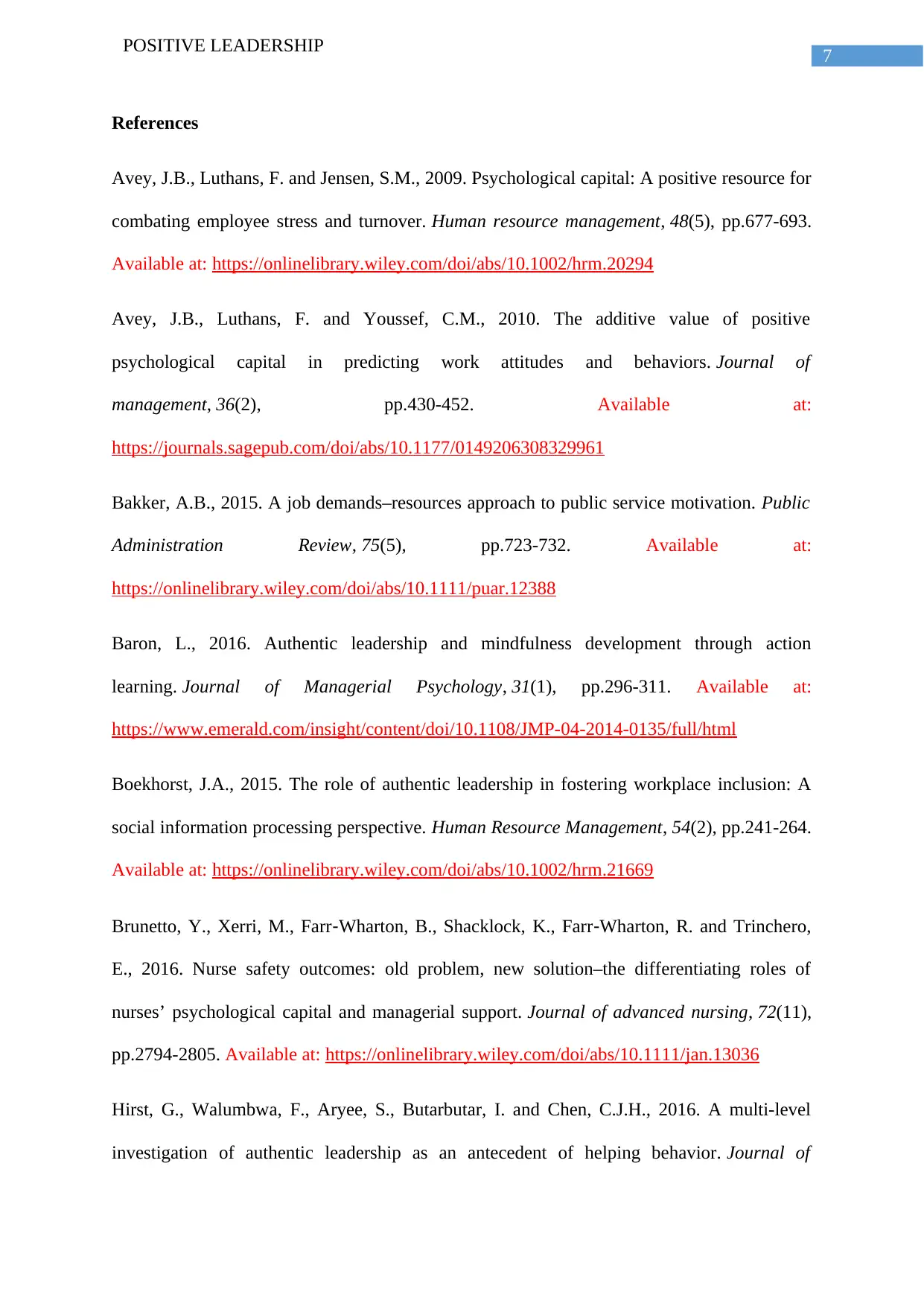
7
POSITIVE LEADERSHIP
References
Avey, J.B., Luthans, F. and Jensen, S.M., 2009. Psychological capital: A positive resource for
combating employee stress and turnover. Human resource management, 48(5), pp.677-693.
Available at: https://onlinelibrary.wiley.com/doi/abs/10.1002/hrm.20294
Avey, J.B., Luthans, F. and Youssef, C.M., 2010. The additive value of positive
psychological capital in predicting work attitudes and behaviors. Journal of
management, 36(2), pp.430-452. Available at:
https://journals.sagepub.com/doi/abs/10.1177/0149206308329961
Bakker, A.B., 2015. A job demands–resources approach to public service motivation. Public
Administration Review, 75(5), pp.723-732. Available at:
https://onlinelibrary.wiley.com/doi/abs/10.1111/puar.12388
Baron, L., 2016. Authentic leadership and mindfulness development through action
learning. Journal of Managerial Psychology, 31(1), pp.296-311. Available at:
https://www.emerald.com/insight/content/doi/10.1108/JMP-04-2014-0135/full/html
Boekhorst, J.A., 2015. The role of authentic leadership in fostering workplace inclusion: A
social information processing perspective. Human Resource Management, 54(2), pp.241-264.
Available at: https://onlinelibrary.wiley.com/doi/abs/10.1002/hrm.21669
Brunetto, Y., Xerri, M., Farr‐Wharton, B., Shacklock, K., Farr‐Wharton, R. and Trinchero,
E., 2016. Nurse safety outcomes: old problem, new solution–the differentiating roles of
nurses’ psychological capital and managerial support. Journal of advanced nursing, 72(11),
pp.2794-2805. Available at: https://onlinelibrary.wiley.com/doi/abs/10.1111/jan.13036
Hirst, G., Walumbwa, F., Aryee, S., Butarbutar, I. and Chen, C.J.H., 2016. A multi-level
investigation of authentic leadership as an antecedent of helping behavior. Journal of
POSITIVE LEADERSHIP
References
Avey, J.B., Luthans, F. and Jensen, S.M., 2009. Psychological capital: A positive resource for
combating employee stress and turnover. Human resource management, 48(5), pp.677-693.
Available at: https://onlinelibrary.wiley.com/doi/abs/10.1002/hrm.20294
Avey, J.B., Luthans, F. and Youssef, C.M., 2010. The additive value of positive
psychological capital in predicting work attitudes and behaviors. Journal of
management, 36(2), pp.430-452. Available at:
https://journals.sagepub.com/doi/abs/10.1177/0149206308329961
Bakker, A.B., 2015. A job demands–resources approach to public service motivation. Public
Administration Review, 75(5), pp.723-732. Available at:
https://onlinelibrary.wiley.com/doi/abs/10.1111/puar.12388
Baron, L., 2016. Authentic leadership and mindfulness development through action
learning. Journal of Managerial Psychology, 31(1), pp.296-311. Available at:
https://www.emerald.com/insight/content/doi/10.1108/JMP-04-2014-0135/full/html
Boekhorst, J.A., 2015. The role of authentic leadership in fostering workplace inclusion: A
social information processing perspective. Human Resource Management, 54(2), pp.241-264.
Available at: https://onlinelibrary.wiley.com/doi/abs/10.1002/hrm.21669
Brunetto, Y., Xerri, M., Farr‐Wharton, B., Shacklock, K., Farr‐Wharton, R. and Trinchero,
E., 2016. Nurse safety outcomes: old problem, new solution–the differentiating roles of
nurses’ psychological capital and managerial support. Journal of advanced nursing, 72(11),
pp.2794-2805. Available at: https://onlinelibrary.wiley.com/doi/abs/10.1111/jan.13036
Hirst, G., Walumbwa, F., Aryee, S., Butarbutar, I. and Chen, C.J.H., 2016. A multi-level
investigation of authentic leadership as an antecedent of helping behavior. Journal of
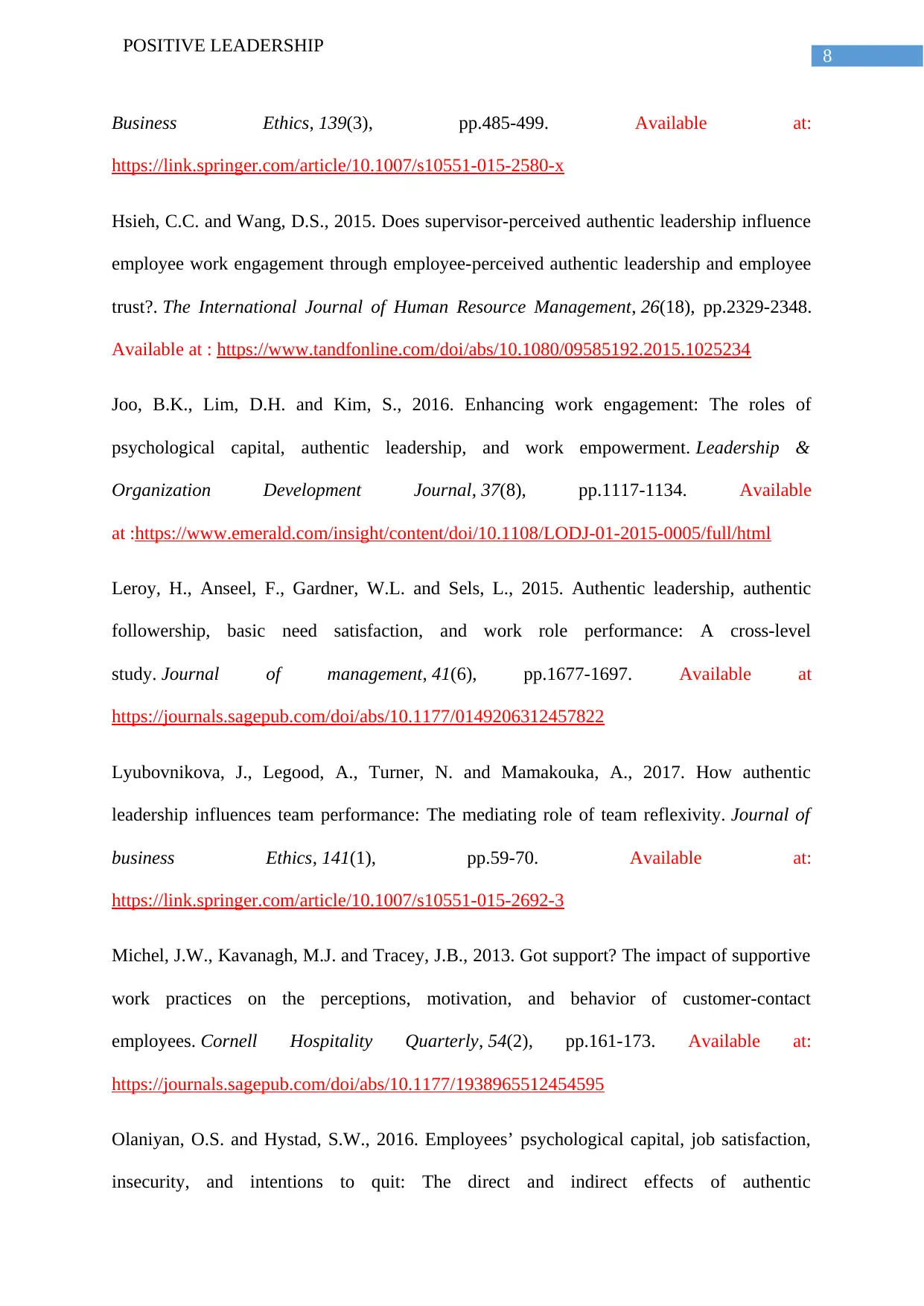
8
POSITIVE LEADERSHIP
Business Ethics, 139(3), pp.485-499. Available at:
https://link.springer.com/article/10.1007/s10551-015-2580-x
Hsieh, C.C. and Wang, D.S., 2015. Does supervisor-perceived authentic leadership influence
employee work engagement through employee-perceived authentic leadership and employee
trust?. The International Journal of Human Resource Management, 26(18), pp.2329-2348.
Available at : https://www.tandfonline.com/doi/abs/10.1080/09585192.2015.1025234
Joo, B.K., Lim, D.H. and Kim, S., 2016. Enhancing work engagement: The roles of
psychological capital, authentic leadership, and work empowerment. Leadership &
Organization Development Journal, 37(8), pp.1117-1134. Available
at :https://www.emerald.com/insight/content/doi/10.1108/LODJ-01-2015-0005/full/html
Leroy, H., Anseel, F., Gardner, W.L. and Sels, L., 2015. Authentic leadership, authentic
followership, basic need satisfaction, and work role performance: A cross-level
study. Journal of management, 41(6), pp.1677-1697. Available at
https://journals.sagepub.com/doi/abs/10.1177/0149206312457822
Lyubovnikova, J., Legood, A., Turner, N. and Mamakouka, A., 2017. How authentic
leadership influences team performance: The mediating role of team reflexivity. Journal of
business Ethics, 141(1), pp.59-70. Available at:
https://link.springer.com/article/10.1007/s10551-015-2692-3
Michel, J.W., Kavanagh, M.J. and Tracey, J.B., 2013. Got support? The impact of supportive
work practices on the perceptions, motivation, and behavior of customer-contact
employees. Cornell Hospitality Quarterly, 54(2), pp.161-173. Available at:
https://journals.sagepub.com/doi/abs/10.1177/1938965512454595
Olaniyan, O.S. and Hystad, S.W., 2016. Employees’ psychological capital, job satisfaction,
insecurity, and intentions to quit: The direct and indirect effects of authentic
POSITIVE LEADERSHIP
Business Ethics, 139(3), pp.485-499. Available at:
https://link.springer.com/article/10.1007/s10551-015-2580-x
Hsieh, C.C. and Wang, D.S., 2015. Does supervisor-perceived authentic leadership influence
employee work engagement through employee-perceived authentic leadership and employee
trust?. The International Journal of Human Resource Management, 26(18), pp.2329-2348.
Available at : https://www.tandfonline.com/doi/abs/10.1080/09585192.2015.1025234
Joo, B.K., Lim, D.H. and Kim, S., 2016. Enhancing work engagement: The roles of
psychological capital, authentic leadership, and work empowerment. Leadership &
Organization Development Journal, 37(8), pp.1117-1134. Available
at :https://www.emerald.com/insight/content/doi/10.1108/LODJ-01-2015-0005/full/html
Leroy, H., Anseel, F., Gardner, W.L. and Sels, L., 2015. Authentic leadership, authentic
followership, basic need satisfaction, and work role performance: A cross-level
study. Journal of management, 41(6), pp.1677-1697. Available at
https://journals.sagepub.com/doi/abs/10.1177/0149206312457822
Lyubovnikova, J., Legood, A., Turner, N. and Mamakouka, A., 2017. How authentic
leadership influences team performance: The mediating role of team reflexivity. Journal of
business Ethics, 141(1), pp.59-70. Available at:
https://link.springer.com/article/10.1007/s10551-015-2692-3
Michel, J.W., Kavanagh, M.J. and Tracey, J.B., 2013. Got support? The impact of supportive
work practices on the perceptions, motivation, and behavior of customer-contact
employees. Cornell Hospitality Quarterly, 54(2), pp.161-173. Available at:
https://journals.sagepub.com/doi/abs/10.1177/1938965512454595
Olaniyan, O.S. and Hystad, S.W., 2016. Employees’ psychological capital, job satisfaction,
insecurity, and intentions to quit: The direct and indirect effects of authentic
⊘ This is a preview!⊘
Do you want full access?
Subscribe today to unlock all pages.

Trusted by 1+ million students worldwide
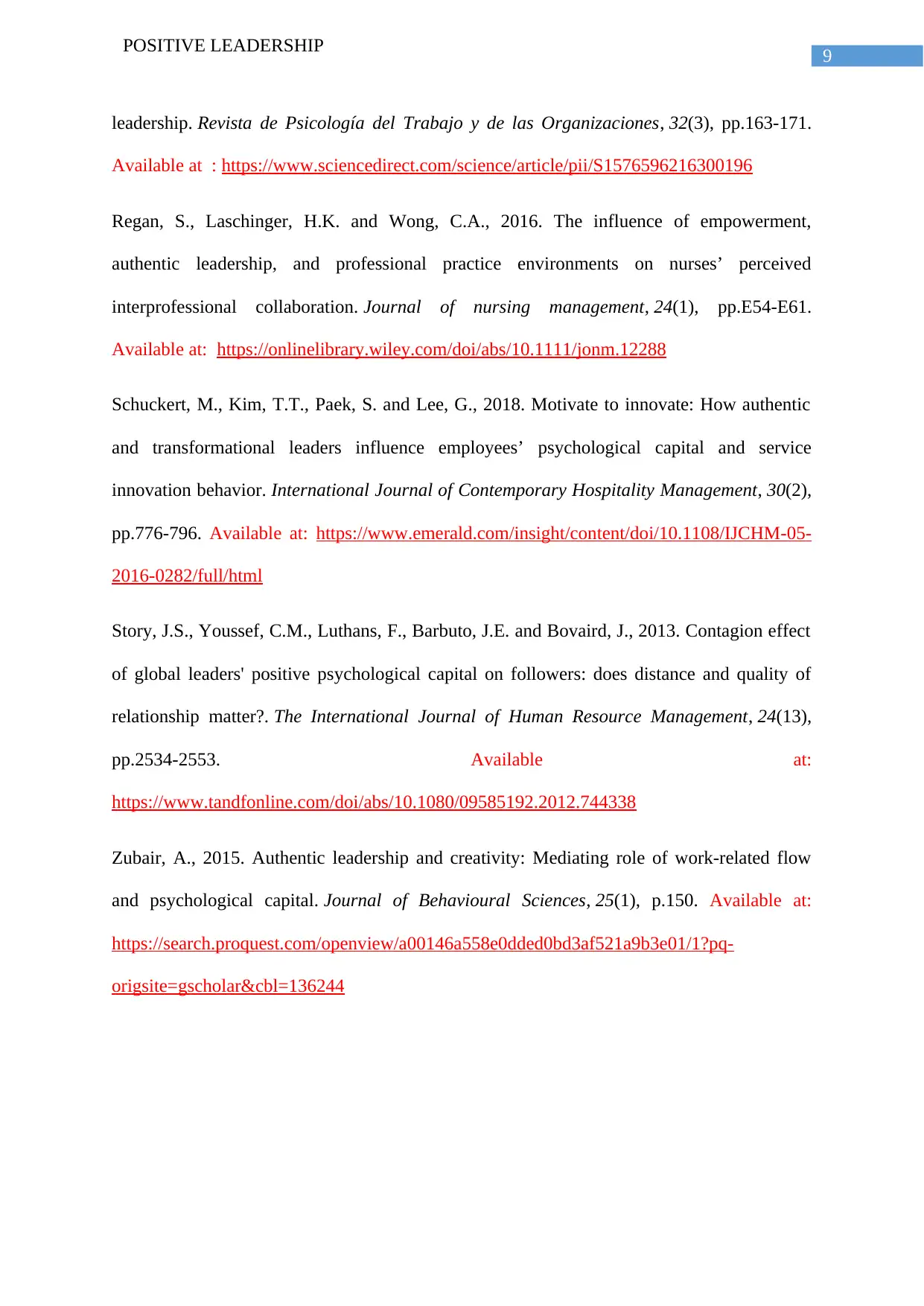
9
POSITIVE LEADERSHIP
leadership. Revista de Psicología del Trabajo y de las Organizaciones, 32(3), pp.163-171.
Available at : https://www.sciencedirect.com/science/article/pii/S1576596216300196
Regan, S., Laschinger, H.K. and Wong, C.A., 2016. The influence of empowerment,
authentic leadership, and professional practice environments on nurses’ perceived
interprofessional collaboration. Journal of nursing management, 24(1), pp.E54-E61.
Available at: https://onlinelibrary.wiley.com/doi/abs/10.1111/jonm.12288
Schuckert, M., Kim, T.T., Paek, S. and Lee, G., 2018. Motivate to innovate: How authentic
and transformational leaders influence employees’ psychological capital and service
innovation behavior. International Journal of Contemporary Hospitality Management, 30(2),
pp.776-796. Available at: https://www.emerald.com/insight/content/doi/10.1108/IJCHM-05-
2016-0282/full/html
Story, J.S., Youssef, C.M., Luthans, F., Barbuto, J.E. and Bovaird, J., 2013. Contagion effect
of global leaders' positive psychological capital on followers: does distance and quality of
relationship matter?. The International Journal of Human Resource Management, 24(13),
pp.2534-2553. Available at:
https://www.tandfonline.com/doi/abs/10.1080/09585192.2012.744338
Zubair, A., 2015. Authentic leadership and creativity: Mediating role of work-related flow
and psychological capital. Journal of Behavioural Sciences, 25(1), p.150. Available at:
https://search.proquest.com/openview/a00146a558e0dded0bd3af521a9b3e01/1?pq-
origsite=gscholar&cbl=136244
POSITIVE LEADERSHIP
leadership. Revista de Psicología del Trabajo y de las Organizaciones, 32(3), pp.163-171.
Available at : https://www.sciencedirect.com/science/article/pii/S1576596216300196
Regan, S., Laschinger, H.K. and Wong, C.A., 2016. The influence of empowerment,
authentic leadership, and professional practice environments on nurses’ perceived
interprofessional collaboration. Journal of nursing management, 24(1), pp.E54-E61.
Available at: https://onlinelibrary.wiley.com/doi/abs/10.1111/jonm.12288
Schuckert, M., Kim, T.T., Paek, S. and Lee, G., 2018. Motivate to innovate: How authentic
and transformational leaders influence employees’ psychological capital and service
innovation behavior. International Journal of Contemporary Hospitality Management, 30(2),
pp.776-796. Available at: https://www.emerald.com/insight/content/doi/10.1108/IJCHM-05-
2016-0282/full/html
Story, J.S., Youssef, C.M., Luthans, F., Barbuto, J.E. and Bovaird, J., 2013. Contagion effect
of global leaders' positive psychological capital on followers: does distance and quality of
relationship matter?. The International Journal of Human Resource Management, 24(13),
pp.2534-2553. Available at:
https://www.tandfonline.com/doi/abs/10.1080/09585192.2012.744338
Zubair, A., 2015. Authentic leadership and creativity: Mediating role of work-related flow
and psychological capital. Journal of Behavioural Sciences, 25(1), p.150. Available at:
https://search.proquest.com/openview/a00146a558e0dded0bd3af521a9b3e01/1?pq-
origsite=gscholar&cbl=136244
1 out of 10
Related Documents
Your All-in-One AI-Powered Toolkit for Academic Success.
+13062052269
info@desklib.com
Available 24*7 on WhatsApp / Email
![[object Object]](/_next/static/media/star-bottom.7253800d.svg)
Unlock your academic potential
Copyright © 2020–2026 A2Z Services. All Rights Reserved. Developed and managed by ZUCOL.





